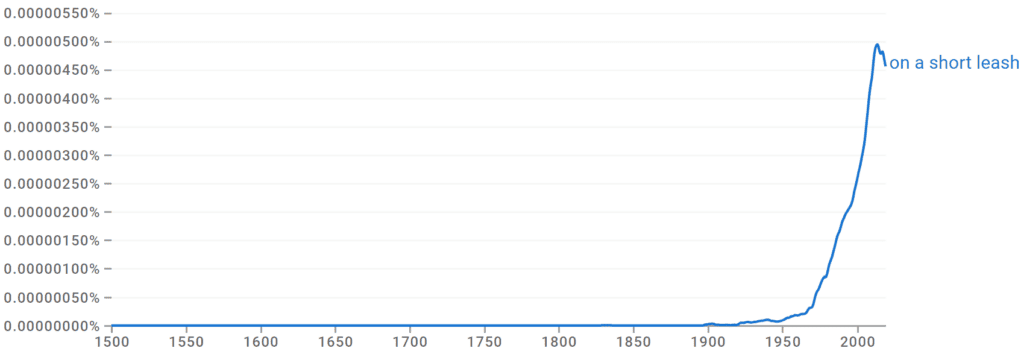Keep on a short leash means maintaining strict control over someone or something. This idiom came about in the 20th century with the idea of keeping dogs on tight leashes.
Idioms are words and phrases with figurative meanings distinct from their literal translations. Their cultural and emotional weight offers a shorthand way of communicating more complex messages to those around us.
But there’s more than meets the eye with this one, so sit tight as I hand over the details about using this phrase so you don’t get it wrong.
Short Leash vs. Tight Leash Idioms: What’s the Difference?

Keep on a short leash means to tightly control someone or something, to restrict someone’s freedom, or to curtail someone’s independence, while keep on a tight leash intensifies that control, implying proximity and an almost uncomfortable tautness. Both idioms stem from the concept of dog handling, but each has nuanced differences, depending on the context you’re using.
- Adele sure keeps that man on a short leash; he can hardly go anywhere.
- Adele keeps a tight leash on her boyfriend when they’re at a club.
The two phrases are similar enough to be used interchangeably, but these two examples highlight the vague difference between them.
On a Short Leash Meaning Explained
To keep someone or something on a short leash means you’re exercising rigorous control, usually to a point where the freedom of the individual or entity in question is significantly restricted. This could apply to relationships, pet ownership, or even management styles.
Origin and Etymology of the Phrase ‘Keep on a Short Leash’

The idiomatic expression “on a short leash” has its roots in the tangible act of restraining a dog using a short leash, allowing the handler to exercise closer and stricter control over the animal. The phrase began to gain traction in the 20th century, although the precise decade or point of origin remains elusive.
Its metaphorical adaptation to depict tight control or restriction over a person or situation naturally evolved from this literal beginning. In various contexts, it conveys the idea of someone being closely monitored, restricted in their actions, or having limited freedom. Over time, the phrase has permeated popular culture, becoming a common way to describe situations where someone or something is being kept under tight supervision or control.
Synonyms for ‘on a Short Leash’
- Under one’s thumb
- Held back
- Restricted
- Controlled
- Confined
- Micromanaged
Using Keep on a Short Leash in a Sentence

- Our manager keeps us employees on a short leash to meet deadlines.
- She keeps her spending on a short leash to save for her future plans of owning a home.
- I had a super strict upbringing and was kept on a short leash at all times.
- To prevent mistakes, Dave was kept on a short leash during the whole project.
- The coach keeps the rookies on a short leash to maintain discipline on the team.
- Jane keeps her emotions on a short leash to stay focused on her goals.
- My dad says that with a high-risk investment, it’s best to keep it on a short leash.
- Parents sometimes feel the need to keep their teenagers on a short leash to prevent disaster.
- The director kept the cast on a short leash during filming to ensure a flawless performance.
- Janice is a horrible girlfriend; she always keeps her boyfriends on short leashes.
Time to Stretch the Leash on Your Vocabulary!
Keep on a short leash is pretty self-explanatory, but it’s still important to brush up on the logistics and make sure you’re using this phrase correctly. Idioms can transform a sentence, but only if it makes sense. Now, unleash your newfound idiom knowledge into the world and come back to read about even more fun idioms like this one!
